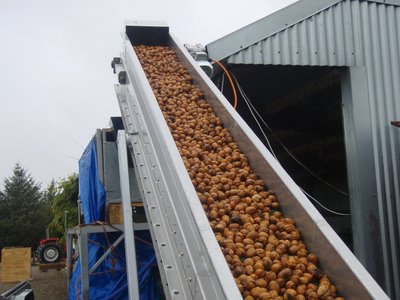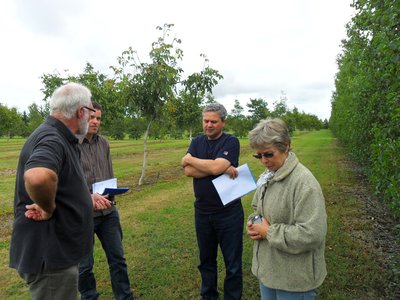Local equipment wins out over European design
Monday, 13 January, 2014
Aylesbury Walnuts - one of New Zealand’s largest walnut orchards with more than 4500 trees - is gearing up for an increase in production. The company chose Wyma’s post-harvest equipment over French competitors to aid the process.
Early movers to the Canterbury walnut market, Frank and Margaret Brenmuhl did their fair share of research - including hands-on research in France - to determine which equipment best suited their steady growth in production.
“Most importantly, we needed customisable equipment to accommodate our growth in production. We also needed something that would stand the test of time. The road to full capacity for a walnut orchard is a long one,” said Frank.
The Brenmuhls’ interest in the walnut industry grew from Margaret’s passion for trees and their desire to break away from the early mornings of dairy farming. They bought land in 1996 with friends from Reefton and planted shelter trees in the same year, before planting their walnut trees in 1999.
At the time, there was huge hype in the New Zealand walnut industry stemming from research at Lincoln University analysing the viability of walnut orchards and establishing New Zealand varieties. “Demand was outdoing supply and we (New Zealand) were importing about 500 tonnes a year from China and the States,” Frank said.

Seventeen years on and now processing 3 to 4 tonnes of walnuts each year, the Aylesbury Walnut line consists of a Wyma Hopper, Gooseneck Elevator and Conveyor. Frank believes this equipment has improved the laborious task of washing and sorting produce ready for sale. “After a slow start, we are really seeing progress over the last couple of years,” Frank said.
Situated near West Melton, Aylesbury Walnuts is close to Wyma’s headquarters. However, this was not the only reason the Brenmuhls chose to install a Wyma line. Frank researched local equipment compared to overseas equipment. “Price was much the same but we found Wyma’s equipment was better quality than that of the French companies,” he said.
The ability to customise equipment was one of the most valuable assets that Wyma provided. “Our orchard has the potential to produce 80-100 tonnes a year, so the equipment needed to be adaptable,” said Frank. “Wyma has been excellent. We put forward an idea and they delivered - can’t ask for better, really.”

Maria Tiede - Frank and Margaret’s daughter - holds a Masters in Technology, so understandably she took an interest in the planning stages of the processing line. She was impressed with the quality and robustness of the equipment.
“Wyma thought about the finer details, unlike some competitor products I have seen, right down to the edges of the conveying inspection table which has smooth edges to rest forearms for long periods during inspection,” said Maria.
“Wyma’s knowledge certainly helped us to customise a line specific to walnuts. Their experience showed when it came to selecting cleat size, hopper design and movement of produce through the line.”
Wyma also had to meet a unique request from Frank: the conveyor had to be able to run at what he calls “wife speed” - slow enough for Margaret to be able to sort the walnuts by herself at the belt if necessary.
Maria’s interest in Wyma led her to request a tour through the Wyma factory and after meeting with the engineering manager, Peter Knotts, the tour ultimately led to a job as a Wyma design engineer. “With her background, I knew she would fit in well here,” Peter said.
Maria also has her own walnut orchard, which is in the early stages of growth. She plans to use the Wyma line to process her walnuts as production increases. Maria believes employment at Wyma has given her exposure to large, international processing lines and other competitor products out there. “With that experience I look forward to working with my parents to develop our line further as the trees mature,” Maria said.
Lighting up wine spoilage in real time with novel biosensor
A biosensor that glows when acetic acid is detected has been built by researchers to help...
Novel food processing technologies retain more nutrients in food
The potential of a range of modern techniques to improve the nutritional profiles of grain-,...
Shaking up machine changeover times on cartoning line
A food manufacturer of shakes and protein bars reduced the time taken for machine changeovers on...











